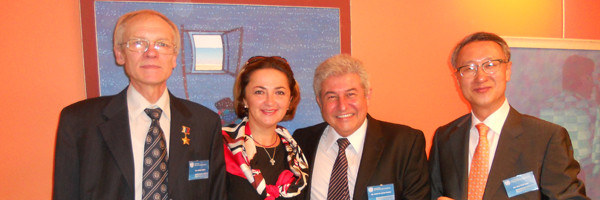ITPO Head Meeting 2012

First of all, I would like to thank everyone for this opportunity to share our main lines of action and to introduce some ideas for the near future of our ITPOs.
During the last years, ITPO Italy has focused on sectoral choices and reinforced those fields in which Italy excels. Our two main sectors of intervention are:
Agro Industry and Green Industry
As you can see in the slide, we have pointed out some specific sub-sectors related to agro-industry in which we carried out some valuable initiatives:
- Agricultural mechanization
- Fishery and cold chain
- Food processing
- Packaging solutions
- Textile & Leather
- Woodworkings
The second sub-sector on which we have focused is energy and environment, and specifically:
- Energy efficiency
- Environmentally-friendly technologies
- Renewable energy solutions such as solar thermal energy, photovoltaic, wind energy, biogas, etc.
- Water and waste treatment/management
We have also been implementing technical cooperation projects such as:
- promoting green industry investment in renewable energy and environmentally-friendly technologies for SMEs in Egypt and Morocco;
- the platform for Senegal and Mozambique to enhance the capability of their companies to promote agro-industrial investments and industrial partnerships between African and Italian companies;
- the SMEs Cluster Development in Vietnam, a successful project implemented in cooperation with Cluster Business Linkage Unit. For example, in the woodworking sector, we developed a tailored made executive master for Vietnamese entrepreneurs. They visited Italy for two months to do research at the University of Pordenone to acquire know-how and improve their skills in the furniture sector. Today, many Italian associations and companies in this field are discussing how to consolidate the relationship with Vietnam, as well as joint-financing some activities.
Technology expertise is also a key point in supporting SME scale up. We are focusing on identifying the most suitable technologies and expertise for specific industrial chains. Post-harvesting management and solar thermal technologies are specific areas of focus to provide energy to small communities in Morocco. We developed this activity in close cooperation with MASEN (Moroccan Agency for Solar Energy).
As a Global Forum, we have cooperated with Ipack-Ima, one the main representatives in the packaging industry, since 2009. We share with Ipack-Ima a common interest to foster the promotion of food security and food safety technologies to help alleviate world hunger. We have been working jointly in promoting different initiatives such as the “Enhancing Food Safety and Food Security in African countries” forum held in Milan, with the participation of our Director General and more than 50 delegates from Africa. This past week, an agreement was signed by Ipack-Ima, East African Community Countries and UNIDO to organize the first Packaging Fair in East Africa, that will be held in Nairobi in 2014.
Also many high level country presentations and business meetings (in some cases more than 300 business meetings) have been organized by my office, such as with Ethiopia and Iraq high level institutions and entrepreneurs, and which fully involved the Italian business community. Other events include the most recent country presentation of Bahrain, organized with our friend Dr. Hashim Hussein, Director of UNIDO ITPO Bahrain.
Besides the collaboration with the Cluster Business Linkage Unit, we cooperate with environment and renewable energy units to identify experts in energy efficiency. We also launch technical cooperation initiatives to support Egypt and Morocco in renewable energy and environmentally friendly technologies.
Furthermore, ITPO Italy works with the agro branch in different activities related to food safety for Africa and leather sector initiatives for Ethiopia and India.
During the last month, important promotional activities for projects developed by UNIDO in Iraq and Bahrain have been supported by our office. In this moment we are working towards the empowerment of women by formulating project initiatives.
Facing new global trends and challenges, our office has focused initiatives on the following points:
Firstly, linking developing countries’ industrial needs with the appropriate Italian technology and best practices to facilitate SME scale up; Italy excels in many areas in terms of technology and productive models that can be applied to many countries in the developing world with a similar entrepreneurial structure.
Due to the budget review and its constraints, we participate in fund-raising activities. Additionally, we scout for co-financers in National agencies, UNIDO and private sectors to support agro and green industry projects. With the financial support of the Italian Ministry for the Environment, we are implementing environment and renewable energy projects in Morocco and Egypt.
Our focus has also been geared towards a greater involvement of new actors of emerging economies (such as Investment Promotion Agencies, specialized institutes and academia) to increase networking activities and to build an inclusive productive model that can integrate universities, specialized agencies, and industry associations.
It is important to note the constant alignment of our activities with HQ projects: developing policies, and Italian Government guidelines to maximize goal achievement. The best way to optimize economic and human efforts is to design long-term strategies and programs that can bring tangible benefits to the local business environment.
Our office has strengthened its cooperation with other ITPOs and other UNIDO offices as it has been demonstrated in the recent activities listed here:
- Bahrain Country Presentation (ITPO Bahrain)
- Iraq Country Presentation (UNIDO Iraq Program)
- Armenian Textile Forum (UNIDO Center for International Industrial Cooperation in Yerevan)
- Enterprise Business for Development Forum (UNIDO Hanoi)
- African Union and UNIDO Conference (ITPO Network)
We believe that the implementation of Technical Cooperation projects is a key asset that could increase effectiveness of ITPO initiatives and would imply a much more cohesive support to targeted developing countries. We have started to manage some TC projects, and we plan to launch large scale initiatives, with the possibility to become the allotment holder of their respective funds.
In this way:
- ITPOs help decentralize the implementation of TC projects from HQs;
- ITPOs impact on SMEs is reinforced with relevant positive effect at local and national level;
- ITPOs could directly involve the private sectors in the co-financing of TC projects’ extension; as we accomplished recently with the SME Cluster Development in Vietnam.
As you can see in the slide, referring to the proposal to expand the ITPOs’ mandate to include representation functions, we strongly support the idea that UNIDO ITPOs should include representative functions in the host countries. As stated by the last independent evaluation “ITPO Italy has built a considerable amount of linkages with the Italian political and business community, and has played an increasingly effective role as a UNIDO representative in Italy.” Naturally, this extended role should be implemented without changing the term of reference of our current ProDoc.
Some key points of ITPOs are as follows:
- ITPOs act as focal points for HQs with host country governments
- ITPOs have extensive reach-out in the private sector and the institutional realm, which increases ITPOs role as main point of reference in an inclusive business environment
- ITPOs would strengthen linkages between host governments, HQ branches and other UN agencies based in Rome, such as FAO, IFAD and WFP.
In conclusion, please let me share with you some ideas that we would like to implement in the near future:
First, it is important to strengthen capacity building programs such as technical seminars and tailor made executive masters for entrepreneurs in cooperation with Italian universities. A recent successful case was in the woodworking sector involving Vietnamese entrepreneurs carried out in cooperation with the University of Pordenone.
The second concept is to export the “Mutual Credit Guarantee Scheme” in specific countries to strengthen the local credit system for SMEs in cooperation with Italian banks. UNIDO has successfully implemented this model in India and, as a result, there has been no demand to identify new instruments to finance and support SMEs. If well implemented, this could be a useful instrument to achieve this purpose.
The last concept is to transfer the Italian cluster model through the implementation of cluster twinning programs in cooperation with an Italian association. We have already applied this industrial district approach in countries like India (leather sector); however, we would like to materialize this model in a Tool Kit ready to export to other countries.
Thank you again for your attention.

